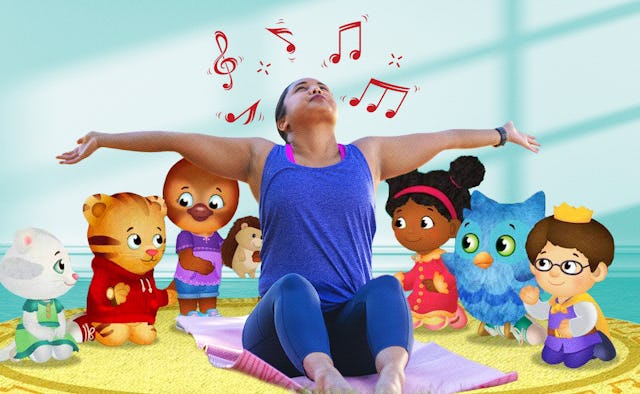The Day I Turned To ‘Daniel Tiger’ For My Own Frustration
What happened when I applied the parenting techniques on myself.

A few days ago — after handling work responsibilities, cooking dinner, picking up the same socks three times in one day, and seeing the spaghetti I lovingly made being swirled around on the dining room table — I caught myself singing a little diddy I first heard on “Daniel Tiger’s Neighborhood.” The protagonist of the PBS Kids cartoon often works out his fears and anxieties through songs; this one has a jazzy vibe and goes, “when you’re feeling mad and you want to roar, just take a deep breath, and count to four, 1, 2, 3, 4.”
I don’t know what made me start singing this song, other than the fact that we had recently watched the episode, and it was the first thing I grabbed when I was having a very frustrating moment. It felt weird to sing a kids’ song to myself, but the technique worked, and I immediately felt calmer.
I began to notice that, in moments of stress or anger, I was actually using several of the techniques that I’ve tried to teach my children to manage their own feelings. Usually, when my 5-year-old son gets frustrated, we try to practice a technique that I’ve picked up from a book, a podcast, or a Facebook group for frustration tolerance. I attempt to explain the technique during a time when he’s not mad, and while that doesn’t always work, apparently, I’m teaching myself the lesson instead.
These frustration tolerance techniques have made a big difference in my mental health, self-care, and emotional management. Here’s why.
I’ve learned more about myself
Figuring out what triggers me and makes me upset or frustrated has not come easily to me. I definitely lean into the “people pleasing” category, but with children you cannot avoid feeling all of the feelings. So, thanks to these moments when I want to lose my cool I’m forced to pay attention to what my children are doing and what, exactly, is so upsetting to me.
For example, I raised my voice one evening when I had repeated my request for my boys to jump into the bathtub for the fourth time. Apparently I do not do well when I’m being ignored and have not taken a break between dinner time and our evening routines. I now understand that I need about 15 minutes to decompress after making it through the process of cooking dinner, serving my family, hearing about their days and then trying to pick up a little bit. These little triggers are learning lessons for me to know about myself and recognize when both adults and children alike do things that affect me emotionally.
Taking deep breaths more often regulates my mood
Many of the frustration tolerance techniques are centered around deep breathing, taking some time out to calm down, and generally stepping away from the action. It sounds so simple, so fundamental, that I cannot believe I have not been doing this more often. Whether I’m in a difficult conversation with a work colleague or having a tough day, a step away has been mind clearing. (Like the song says: “When you’re feeling mad and you want to roar, just take a deep breath, and count to four…”) I regularly take more midday walks and try to put my phone down for some deep thinking throughout my day. When I miss these moments, I’ve already realized, I’m not as effective and I have less patience.
Embracing frustration has made me more emotionally intelligent
As parents we generally want to save our children from their negative or hurting feelings, and that’s not always a good thing. Some things in life are just challenging, and we cannot save our children from all future pain and frustration — cue this article as one example. Experiencing frustration during childhood and learning how to manage it properly builds up their endurance for stronger emotional development. Handling uncomfortable moments is a constant in adulthood and working to manage all of my emotions, good and bad, has allowed me to handle certain situations differently.
Boundaries are a way of life
The internet throws around the word “boundaries” a lot — for good reason. Children with low frustration tolerance need boundaries so they can understand that limits are a part of life. Some of the times that my frustration rears is head are when I’m being told “no”, “wait”, or life is gently disciplining me. Even as parents we need to both respect and place boundaries in our life and leave it to our children to help us understand that life lesson.
Ultimately, I’ve been learning just as much from my children as I think I’m teaching them and it’s been an amazing journey so far. Next time I’m singing Daniel Tiger and deeply breathing myself into a calmer state, I’ll do so knowing that I’m setting a great example for my boys, but also parenting myself to becoming a better mother.
Rachel Pierre is an innovative strategist, writer, podcaster, and mom of 2 incredible boys. As the founder of Mommifaceted Media, Rachel shares the stories of black motherhood in all facets of life and connects lifestyle brands to moms of color so they can build authenticity and true community. In 2022, Rachel is launching a podcast network to highlight black mom podcasters.
This article was originally published on